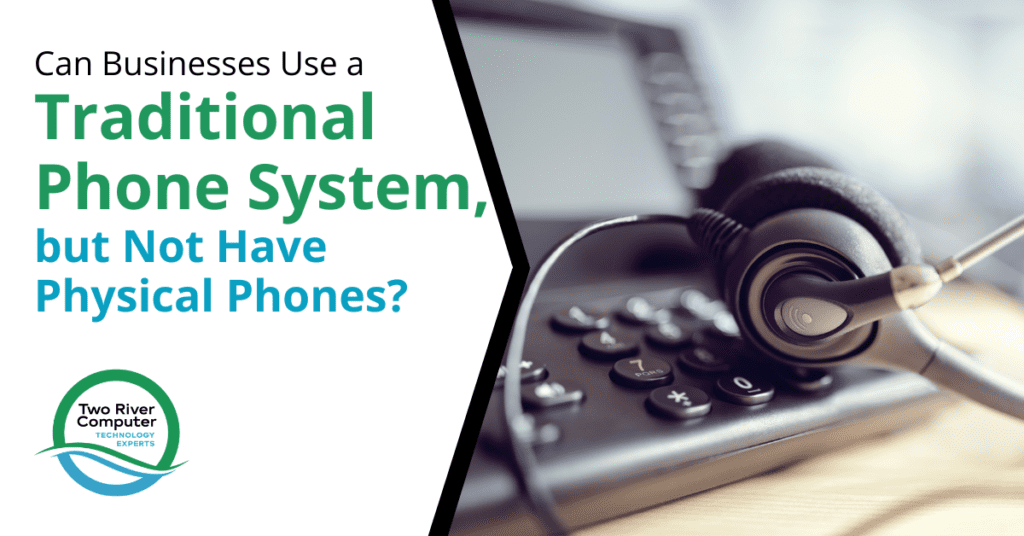
One of the big challenges that companies faced during the pandemic lockdown orders was how to keep using their business phone lines if they weren’t at the office next to those traditional desk phones.
Many tried clunky workarounds like having lines forwarded, but then they lost a lot of the functionality of their phone system like call transferring. If you’re answering a business line that was forwarded to you and the customer asks to speak to another department, they have to hang up and call back in again in most cases.
For employees that need to call out to customers or vendors, not having access to a landline business phone system means they have to use a personal mobile device, which can be problematic. Especially if a customer calls your number back during non-business hours.
And even once the pandemic passes, this challenge isn’t going to be over. Many companies are planning to keep remote working options for both cost savings and business continuity. But there are still companies who are back working in the office. The Structured cabling Dallas can provide these companies with innovative phone systems to keep data and communication networks optimal and efficient. If your business needs to improve your customer service strategies, you may outsource a phone answering service in addition to having a modern phone system.
The number of permanent remote workers is expected to double in 2021.
Think of Your Business Phone System Differently
Do you really need to have physical phones on every desk to enjoy the features of a full company phone system? What are you giving up by moving away from a landline to VoIP phones?
One thing that can keep business owners stuck in the past with a legacy phone system is being worried they’ll be losing something by ditching those desk phones.
But the things you’re giving up when moving from landline to VoIP are just weighing you down, such as:
- Being tied to one specific physical phone to answer a line or extension
- Expensive new line installation costs
- Ongoing physical phone system maintenance costs
- Higher local and long-distance costs
- Problems accommodating remote or mobile employees
- Outages if damage happens to the office (tornado, flood, etc.)
What are you NOT giving up by moving from an older landline system to a VoIP business phone system?
You’re not giving up:
- Business features like hold music, call transfer, auto-attendant, conferencing, and more
- The ability to have extensions for different employees/departments
- Excellent call quality
- Your business phone numbers
- Local numbers when you want to add a line
- Customer support when you have a question or support request
Modern VoIP systems successfully and easily use mobile apps and desktop apps for any time/anywhere access to all traditional business phone needs.
Business Advantages of VoIP Business Phone Systems
When you switch from a traditional landline and desk phone set up to VoIP, not only are you not giving up important features of a business phone system, you gain more functionality.
For example, because VoIP is internet-based, you can easily switch from a voice to a video call at the click of a button. You can even have your voicemails transcribed and emailed to you, something a traditional landline system can’t do.
Here are some of the advantages for your business when you drop the physical phones and move to VoIP.
Freedom to Use Your Business Lines from Anywhere
VoIP desktop and mobile apps allow employees to make and receive calls through your business lines from anywhere. They are not tied to a specific place or a specific physical phone.
This is an advantage even if your team mostly works in the same office because it allows them the mobility to get important calls no matter where they are (in the conference room, etc.).
74% of employees prefer using an app on their mobile phones for VoIP business calls.
Calls can be placed and received from:
- Computer
- Mobile device
- VoIP desk phone (Yes, for those employees that prefer a desk phone, VoIP can be used with those too!)
You Keep Business-Class Phone Features
You’re not giving up any of the business-class features when using VoIP. Internet-based phone systems are designed to have all the same “bells and whistles” as traditional business phone systems.
This includes things like:
- Auto-attendant
- Company directory
- Hold music
- Call transferring
- Group ring
- Voicemail
- Caller ID
- Call blocking
- And many more
You might find that you can now afford to have features you couldn’t add to your traditional phone system because they were too expensive.
Cost Savings
You can benefit your bottom line significantly by moving to a VoIP business phone system. The average operational cost savings is 75%.
So, in addition to gaining more flexibility in how your business lines are answered you save significantly on the cost of your phone system overall.
Positions You for Resiliency
The way business operates has already gone through a major transformation over the last decade due to cloud technology and a global pandemic. Companies need to have resilient systems that can be operated from anywhere.
VoIP phone systems give companies the security they need for business continuity in the face of unexpected crisis events.
Get Expert Support When You Switch to VoIP
Two River Computer can help your business with a smooth transition to a business VoIP system. We can also provide ongoing support for any IT needs.
Contact us today for a free consultation. Call 732-747-0020 or reach us online.


